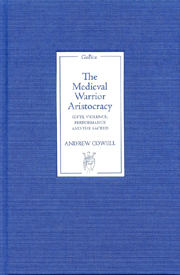Book contents
- Frontmatter
- Contents
- Acknowledgements
- Introduction
- 1 The Power of Giving
- 2 The Symbolic Constitution of the Giving Subject: William the Conqueror and Robert Guiscard
- 3 Violence and “Taking”: Towards a Generalized Symbolic Economy
- 4 Taking an Identity: The Poem of the Cid
- 5 The Sacred Kept
- 6 The Hero, Gratuity and Alterity: The Song Of Roland
- 7 The Supplemental Hero: Raoul of Cambrai
- 8 Female Integrity and Masculine Desires in The Nibelungenlied
- 9 Fractured Identities, and the Solution of Chivalry: William of Orange
- Conclusion: A New, Different Warrior Aristocracy
- Works Cited
- Index
5 - The Sacred Kept
Published online by Cambridge University Press: 12 September 2012
- Frontmatter
- Contents
- Acknowledgements
- Introduction
- 1 The Power of Giving
- 2 The Symbolic Constitution of the Giving Subject: William the Conqueror and Robert Guiscard
- 3 Violence and “Taking”: Towards a Generalized Symbolic Economy
- 4 Taking an Identity: The Poem of the Cid
- 5 The Sacred Kept
- 6 The Hero, Gratuity and Alterity: The Song Of Roland
- 7 The Supplemental Hero: Raoul of Cambrai
- 8 Female Integrity and Masculine Desires in The Nibelungenlied
- 9 Fractured Identities, and the Solution of Chivalry: William of Orange
- Conclusion: A New, Different Warrior Aristocracy
- Works Cited
- Index
Summary
Keeping and Transcendence
In the preceding chapters we have come upon instances in which the central goal of an individual seems to be not to give, (or to take), but to keep – recall Roland's concern with his sword Durendal. The importance of inalienable lands – technically the “honor” of a lord – was also mentioned. In these cases, the individuals are not interested in giving these items away, despite the honor that accrues to giving. It is better to keep than to give. And the violence that centers around these objects is for once less about aggressive taking than defensive protection.
Indeed, from a long-term viewpoint, the exploits of William the Conqueror, Robert Guiscard, or the poetic version of the Cid, could be seen as centering on taking and giving, but all in the ultimate pursuit of integrity: an integrity which would allow an end to dependency and even horizontal reciprocity. More prosaically, these individuals want political independence in the form of a heritable, “keepable” title and a crown.
Of course, heritable titles and lands are the antithesis of the fluid social settings where performative identity can be easily established. It seems initially quite ironic that each of these exemplars of performance should manage in one form or another to solidify his positions through the acquisition of a sacred status which is ultimately no longer given or taken, but simply kept.
- Type
- Chapter
- Information
- The Medieval Warrior AristocracyGifts, Violence, Performance, and the Sacred, pp. 87 - 101Publisher: Boydell & BrewerPrint publication year: 2007



